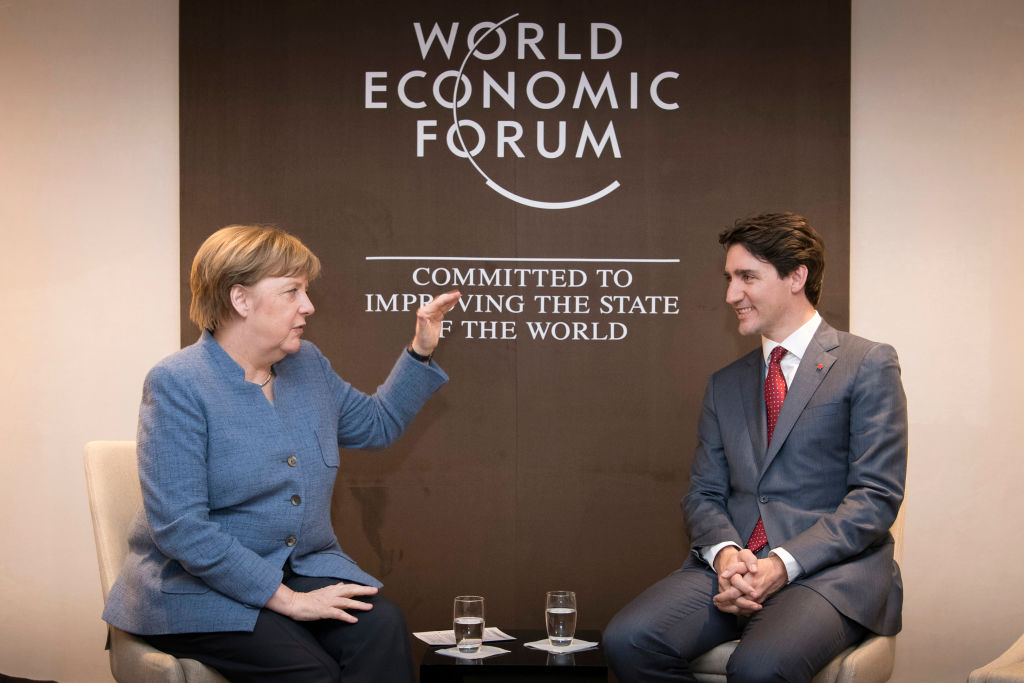Davos has always been riding on a high but it’s in the grip of a downhill spiral

For decades, political and business leaders have gathered at Davos, but the World Economic Forum has started to lose its shine, writes Eliot Wilson
Is there a more emblematic phrase of the early 21st century than “it just doesn’t look good”? Optics are everything, and damn the truth behind them. What looks good, is good, but the reverse is also savagely true. This triumph of appearance over substance is also behind the bell which has begun to toll for the annual meeting of the World Economic Forum at Davos in the Swiss Alps.
Since 1971, the plutocrats, wheeler-dealers, political titans and corporate giants have been coming to Davos. Beginning as the European Management Forum before spreading its wings and becoming the global WEF in 1987, the event brings the world’s business and government leaders together to kneel before the idea of “stakeholder capitalism”, the notion that enterprise will only truly prosper and benefit all if it is designed to be responsive to the needs of everyone: customers, suppliers, employees, shareholders and local communities.
The 2021 edition of Davos was lost to the Covid-19 pandemic, and in 2022 the participants met in May. This year finally was a return to normal service, with a January gathering amid the snow-dusted slopes and cosy Alpine chalets. Normal, except it wasn’t: the world has moved on. Davos was already a dangerously high-profile and ostentatious display of wealth and power before the pandemic, but our new itch for a conspiracy has made Davos look not only spendthrift but sinister.
You do not have to go very deep into the internet to find wild and superficially implausible claims about the octogenarian founder Dr Klaus Schwab, the WEF, globalism, the Great Reset, a new world order, satanism and paedophilia (genuinely, nothing is off-limits for the internet). You can see the problem: hundreds of corporate leaders and wealthy investors rubbing shoulders, in a comfortably opulent setting, with prime ministers, chancellors, and top tier politicians to agree that everyone is well-intentioned and everything is being done for the benefit of humanity.
It is everything conspiracy theorists looking for cabals could possibly fear. Take the setting, for example, in the mountains where Thomas Mann took his rest cure before writing The Magic Mountain, has the atmosphere of a Bond villain, while the celebrity presence at Davos gives the appearance of jesters and minstrels coming to pay homage at the court of a great king. This is an institution where Larry Fink, Queen Rania of Jordan, Al Gore and Yo-Yo Ma are humble trustees, and the paparazzi flashbulbs popped for Idris Elba, there last month to collect his 2023 WEF Crystal Award. There was an appearance by the inevitable Dr Henry Kissinger, now coming up fast on his century and still emblematic of the sinister global elite.
The past few years have begun to transform Davos from a meeting of Masters of the Universe into a collection of those responsible for everything that is wrong with the world. Now the biggest news stories are often protests against the WEF’s globalist agenda, or an analysis of the absentees, who last month included Rishi Sunak, Joe Biden, Xi Jinping, Emmanuel Macron and (of course) Vladimir Putin.
Davos also seems a little old-fashioned now, a quaint meeting over olives and cubes of Gruyère when the world is so accustomed to convening on Zoom or Teams. It is as if the message goes out, We will try to save the world, but you must allow us a glass or two of Krug before we do it. The forum’s credibility is waning, and with it the effectiveness of the group too. Schwab himself will point out that the WEF has no executive power, and can merely bring people together and facilitate conversations. Davos is in essence the world’s biggest influencer, and if it is not credible or in vogue, it has no influence.
If the WEF wants to survive, it must certainly try to cease being a club for old white men, for which Greta Thunberg has been a godsend (though she still requires a chorus of old white men to scold). Its base has broadened but there is a long way to go. Schwab and his team must also think more about outcomes: how will they show what the WEF has achieved in future years, how will they defend the expense and opulence of Davos by demonstrating how it has made the world better?
And it must think about format. Taking a week out of your schedule to go to a small town in Switzerland and sit around talking and listening is now hard to justify as a use of the time of the attendees. We are all utterly familiar with hybrid working now, so to resist its incursion into the WEF would seem absurd. The people whom Davos connects are still the Masters of the Universe, but to maximise their influence, they need to start doing things differently, or that universe will leave them behind.
For all the latest Lifestyle News Click Here
For the latest news and updates, follow us on Google News.

